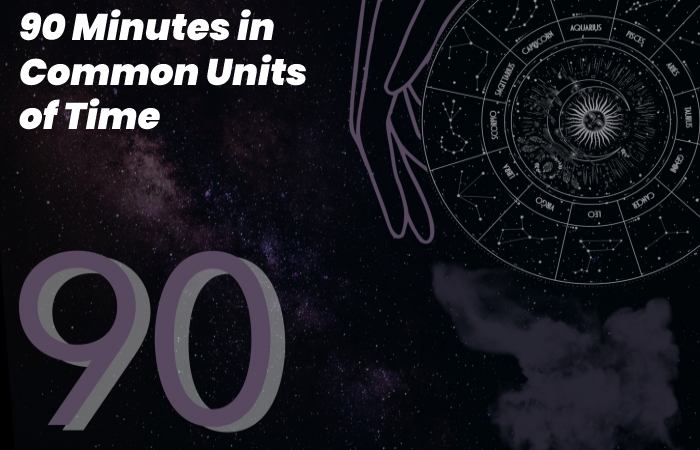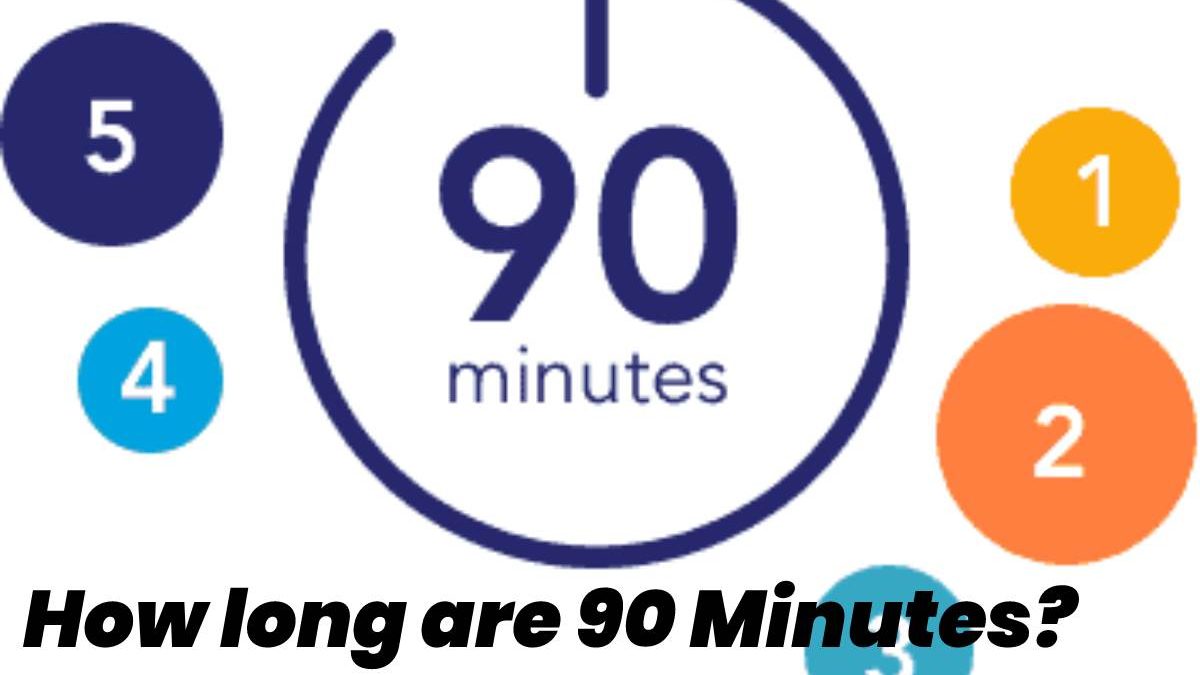How long is 90 minutes = 1 hours and 30 minutes
Table of Contents
How Long is 90 Minutes?
90 Minutes is equal to 1 hours and 30 minutes
Hours in 90 Minutes
Because one hour equals sixty minutes, to convert 90 minutes to hours, you have to divide the number of minutes, 90, by 60.
The 90 minutes into Hours formula is:
h = 90 min / 60
90 min = 1.5 h (decimal, curved to 5 places).
Next, we show you how to alter the amount of time to hours and minutes combined.
90 Minutes to Hours and Minutes
Ninety minutes = 1 hour and 30 minutes.
This alternative conversion is way more shared in daily life!
The non-decimal conversion formula goes as follows:
INT(90/60) hours + MOD(90,60) minutes
To obtain this result proceed as follows:
Obtain the whole number part of division 90 / 60, INT(90/60), and write it down as hrs: 1.
Calculate the remainder of the preceding division as 90 – (1 × 60), and write it down as min: 30.
Proof: (1 × 60) + 30 = 90.
FAQs
How do you Compute 90 Minutes in Hours?
How many hours are 90 minutes?
Are 90 minutes?
Are 90 minutes 1 hour and 30 minutes?
How long is 90 minutes?
How long are Ninety minutes in hours?
Please let us know if somewhat is missing by filling in our remark form. Or get in touch by our contact form and the subject “change between units”.
Additional Information
For the amount of time converted and the result, we sometimes employ the unit symbols min and h, respectively.
E.g. 90 min and 1.5 h.
The abbreviations ′, hr and hrs can also be seen frequently, for instance, 1 hr 30′.
Visit this item to calculate h to min.
The conversion factor from h to min is 1/60; the min: h change ratio is 1:60.
Calculations similar to the one under thought include, for example:
90.5 minutes to hours
90.6 minutes to hours
90.7 minutes to hours
Next, we show you the equivalent periods in related units.
90 Minutes in Common Units of Time

In the table under, you can learn what 90 minutes in other time units are and how it relates to the other ordinary time measurement units.
How long is 90 minutes =
5,400,000,000,000 nanoseconds (ns)
5,400,000,000 microseconds (µs)
5,400,000 milliseconds (ms)
5,400 seconds (s)
1.5 hours (h)
0.0625 days (day)
0.0089285714 weeks (wk)
0.0020547945 months (mo)
0.0001712329 years (yr)
0.0000171233
0.000001712329 centuries (cent)
BTW: Employ our hunt form in the menu and sidebar to locate numerous posts and pages involving these dimensions of time.
The concluding section contains the summary of 90 min to hr and directions for further information in the context of this time transformation.
Bottom Line
If you are still here, you have made it to the end of our article.
Considering our information, table and calculator, you definitively know how long 90 min in hr is.
90 Minutes to Hours
On our page, minutes in hours and minutes, linked at the bottom, you can locate more information in the context, including, for instance, the second as a basic unit of time measurement.
If you like our conversion calculator and information, please share our site on social media, drop us a comment and come back soon.
You can find more time converters in the article index placed in our header menu.
Thanks for visiting 90′ in hours.
The following quick conversion table contains both calculations, minutes converted to decimal hours and min to min + h.
Both results have been produced using our two formulas at the top of this page.
90 Minutes to Hours Conversion Table
Minutes Decimal Hours Minutes and Hours
89.5 1.49167 1h + 29.5′
89.51 1.49183 1h + 29.51′
89.52 1.492 1h + 29.52′
89.53 1.49217 1h + 29.53′
89.54 1.49233 1h + 29.54′
89.55 1.4925 1h + 29.55′
89.56 1.49267 1h + 29.56′
89.57 1.49283 1h + 29.57′
89.58 1.493 1h + 29.58′
Convert 90 Minutes to Hours
How long is 90 minutes? What are Ninety minutes in hours? Ninety min to hr conversion (moth).
What do Ninety minutes mean in hours?
1.5days. 90 Minutes = 1.5 Hours = 1 Hour and 30 Minutes. Minutes to hours Time Converter 90 hours to minutes. This change of 90 minutes to hours has remained intended by multiplying 90 minutes by 0.0166, resulting in 1.5 hours.
Why is an Hour 60 Minutes and not 100?
The Babylonians made astral calculations in the sexagesimal (base 60) system they congenital from the Sumerians, who industrialised it around 2000 B.C. Although it is unidentified why 60 was chosen, it is notably suitable for stating fractions since 60 is the smallest number divisible by the first six counting numbers …
How long is 90 Minutes?
In Ninety min, there are 1.5 h, which is the same as saying that Ninety minutes is 1.5 hours.
How many minutes is 1 hour in a half
Thirty minutes half an hour, one-half an hour, and one half an hour, are 30 minutes.
How long is an Hour?
Sixty minutes: An hour (symbol: h; also abbreviated hr) is a unit of time conventionally reckoned as 1⁄24 of a day and scientifically reckoned as 3,599–3,601 seconds, depending on conditions. There are 60 minutes in an hour and 24 hours in a day.
What is the inverse Calculation between 1 Hour and 90 Minutes?
Performing the inverse calculation of the relationship between units, we obtain that 1 hour is 0.66666667 times 90 minutes.
Change Plan
The conversion issue from minutes to hours is 0.016666666666667, which means that 1 minute is equal to 0.016666666666667 hours:
1 min = 0.016666666666667 hr
To convert Ninety minutes hooked on hours, we must multiply Ninety by the conversion factor to get the time from minutes to hours. We can also form a simple amount to compute the result:
1 min → 0.016666666666667 hr
Ninety min → T(hr)
Solve the above proportion to get the time T in hours:
T(hr) = ninety min × 0.016666666666667 hr
T(hr) = 1.5 hr
The final result is:
Ninety min → 1.5 hr
We conclude that minutes Ninety is equal to 1.5 hours:
How long is 90 minutes = 1.5 hours
Alternative Conversion
We can also convert by using the inverse value of the conversion issue. In this case, 1 hour is equal to 0.66666666666667 × Ninety minutes.
Another way is the maxim that Ninety minutes is equal to 1 ÷ 0.66666666666667 hours.
Approximate Result
We can get rotund our final result to an estimated numerical value for practical purposes. We can say that ninety minutes is about one fact, five hours:
90 min ≅ 1.5 hr
An alternative is that one hour is approximately zero point six six-seven times ninety minutes.
Conversion Table
For quick orientation purposes, below is the conversion table you can use to change from minutes to hours
Minutes (min) Hours (hr)
91 minutes 1.517 hours
92 minutes 1.533 hours
93 minutes 1.55 hours
94 minutes 1.567 hours
95 minutes 1.583 hours
96 minutes 1.6 hours
97 minutes 1.617 hours
98 minutes 1.633 hours
99 minutes 1.65 hours
100 minutes 1.667 hours
Conversion Units
The units involved in this change are minutes and hours. This is how they are defined:
Minute
A minute is a unit of time or angle. The minute (symbol: min) equals 1⁄60 (the first sexagesimal fraction) of an hour or 60 seconds as a time component. In the UTC standard, a minute on rare times has 61 seconds, a consequence of leap seconds (there is a provision to insert a negative leap second, which would result in a 59-second minute, but this has never happened in more than 40 years under this system). As a viewpoint unit, the minute arc equals 1⁄60 of a grade, or 60 seconds (of the turn). Though not an SI unit for either time or angle, the minute is putative for use with SI units for both. The SI cyphers for minute or minutes are min for time size, and the prime symbol after a number, e.g. 5′, for angle measurement.
Hour
An hour (symbol: h; also abbreviated hr.) is a unit of time conventionally calculated as 1⁄24 of a day and scientifically reckoned as 3,599–3,601 seconds, contingent on situations. The seasonal, temporal, or unsatisfactory hour was established as 1⁄12 of the night or daytime in the ancient Near East. Such hours varied by season, leeway, and weather. It was subsequently alienated into 60 minutes, each of 60 seconds. The East Asian equal was the shi, which was 1⁄12 of the apparent solar day; a similar system was eventually developed in Europe, which measured its equal or equinoctial hour as 1⁄24 of such days measured from noon to noon. The minor variations of this unit were finally smoothed by making it 1⁄24 of the mean solar day, based on the measure of the sun’s transit along the celestial equator rather than along the ecliptic.

